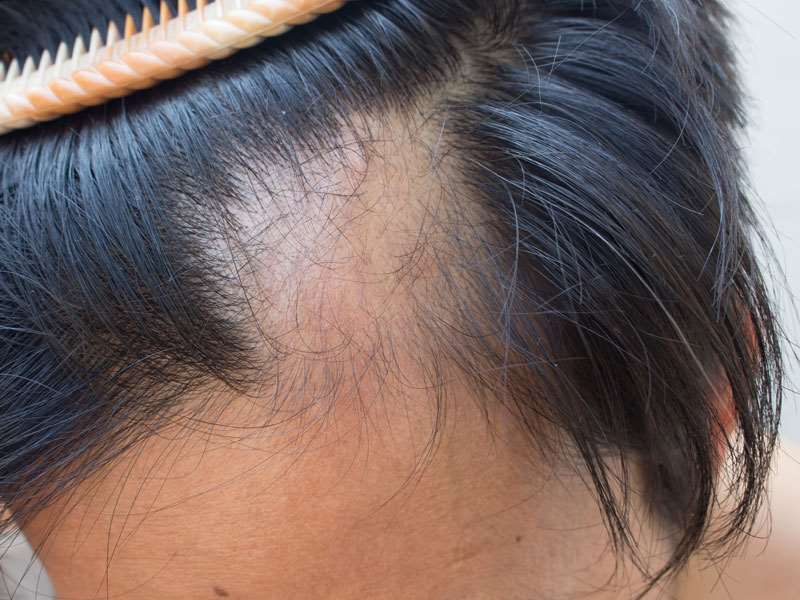Medical Hair Loss affects women.We are here for you along with your loving family and caring friends to help you with your Medical Hair Loss. We know you’re not feeling like your old self and that losing your hair can lead to low self-esteem and anxiety. Lets do what we can to fix that.
Whether you are suffering from a Medical Hair Loss Condition due to Chemotherapy treatments or Cancer, Alopecia, Trichotillomania or even maybe it’s Natural Hair Loss like Thinning Hair, or perhaps your Hair Loss is the result of stress, genetics or even age – yes, we are all getting older! Having a full head of beautiful hair can certainly boost your self-confidence and get you feeling like your old self again. Foxy Hair Alternatives offers Hair Loss Solutions for Women in New York including Medical Hair Loss, Natural Hair Loss, Chemotherapy Hair Loss, Cancer Hair Loss, Alopecia, Hormonal Hair Loss and Trichotillomania. Lets get you back to a place of confidence and comfort when dealing with your hair loss. **Statements and information are shared for informational purposes only. Please consult with your health care provider.** |
Women's Hair LossOften, we think of hair loss as a common problem mostly with men, but many women experience it too.
Surprisingly, less than 45% of women will go through their entire lives with a full head of hair. So what causes Women's Hair Loss? Female Pattern Hair Loss (FPHL) is the most common cause, and it increases with advancing age. Yes, age gets the best of us all! This type of hair loss may begin in a woman's 40s, 50s, or 60s. Female-Pattern Hair Loss (FPHL), affects some 30 million women in the United States. Women’s Hair Loss is typically hereditary, and genes inherited from the mother, father, or both can contribute to a Woman’s Hair Loss condition. Women who experience hair loss often experience psychological distress and impaired social functioning because of it. As female hair loss tends to be a chronic, progressive condition, early diagnosis and Hair Loss Solutions are critical. |
Cancer Hair LossCancer is difficult enough to go through, now I must deal with Cancer Hair Loss?
Your hair may fall out slowly, entirely, or maybe even in patch like sections. Your hair may become noticeably thinner, sometimes even unnoticeably thinner, it may become duller or dryer, there are many Cancer Hair Loss variations. Hair loss related to cancer treatment is usually temporary. |
Chemotherapy Hair Loss
Chemotherapy Hair Loss is not just on your scalp but may cause hair loss all over your body as well. Hair Loss due to Chemo can affect us in many ways. Sometimes your eyelash, eyebrow, armpit, pubic and other body hair also falls out. Some chemotherapy drugs are more likely than others to cause Chemotherapy Hair Loss, and different doses can cause anything from a minor hair thinning to even complete baldness.
Hair Loss occurs because chemotherapy targets all rapidly dividing cells—healthy cells as well as cancer cells. Hair follicles, the structures in the skin filled with tiny blood vessels that make hair, are some of the fastest-growing cells in the body. Some chemotherapy drugs affect only the hair on your head.
Fortunately, most of the time Hair Loss from chemotherapy is temporary.
Hair Loss occurs because chemotherapy targets all rapidly dividing cells—healthy cells as well as cancer cells. Hair follicles, the structures in the skin filled with tiny blood vessels that make hair, are some of the fastest-growing cells in the body. Some chemotherapy drugs affect only the hair on your head.
Fortunately, most of the time Hair Loss from chemotherapy is temporary.
Telogen EffluviumTelogen effluvium is a form of temporary hair loss that typically happens from stress, shock, a traumatic event or even include surgery, childbirth, and serious illness.
Telogen effluvium is different from the hair loss disorder called alopecia areata. Large amounts of a person's hair might fall out, but it is often temporary, and the hair usually grows back. Telogen effluvium is a reversible condition in which hair falls out after a stressful experience. The stress pushes large numbers of hair follicles into a resting phase. Within a few months, those hairs will fall out. In many cases, no treatment is needed and the hair often grows back when the stress goes away. |
Trichotillomania Hair LossTrichotillomania is an Obsessive Compulsive Disorder that causes one to pull hair from all areas of their body, but most often from the head.
We often see women with extensive Hair Loss from their hair pulling and typically encounter about 40 – 70% Hair Loss in most cases. Permanent damage from Trichotillomania (TTM) is certainly a real possibility for many who suffer from it. Here at Foxy Hair Alternatives, we have solutions for covering your bald areas while we wait for Hair Regrowth and full Hair Recovery. |
In some cases, it’s unintentional and you may not realize you are even doing it. Often there are underlying causes for one’s Trichotillomania Hair Loss, it may range from anxiety, to coping with stress, to depression, or even a traumatic experience. This can be especially true with regards to children and young persons. Causes of Trichotillomania are often very complex. It’s more common in women than men and mainly occurs around puberty and typically at menopause.
All treatments for Trichotillomania take time and patience.
But the good news is that your hair can grow back. If it’s been going on for a long time, less will do so, or your hair may grow back a different texture – but you will see an improvement.
All treatments for Trichotillomania take time and patience.
But the good news is that your hair can grow back. If it’s been going on for a long time, less will do so, or your hair may grow back a different texture – but you will see an improvement.
Hormonal Hair LossSevere and prolonged hypothyroidism and hyperthyroidism can cause Hormonal Hair Loss. The loss is diffuse and involves the entire scalp rather than discrete areas.
Hair can appear uniformly sparse and thin. Thankfully, Hair Regrowth can be expected with successful treatment of the thyroid disorder, though it will take several months and may even still be incomplete though. Foxy Hair Alternatives can add hair as you need without surgery. Hypothyroidism is the medical term for having an under-active thyroid gland and is considered one of the most common health problems in America. Those with hypothyroidism will often see their Hair Thinning or becoming dry and brittle. These changes can be present not only on the scalp, but in eyebrows, eyelashes, legs, arm, and pubic hair as well. Come to us to learn more about the affects of estrogen, PCOS, diabetes and other hormonal related hair loss. |
AlopeciaAlopecia is the Greek word for “Hair Loss”.
There are many types of Alopecia. Androgenic Alopecia, (or Female Pattern Hair Loss and Male Pattern Hair Loss) is the #1 type of Alopecia in the world. Alopecia Areata is the next most common type of Alopecia. Cicatricial (Scarring) Alopecia, Traction Alopecia, Alopecia Universalis and Alopecia Totalis are all types of Alopecia, each with specific characteristics and causes. While not all types of Alopecia are inherited, several types are correlated with autoimmune diseases that are hereditary. Autoimmune means that the body’s immune system attacks the body. |
Scalp Psoriasis Hair LossScalp Psoriasis is an autoimmune disease. Psoriasis is caused by your body’s immune system: White blood cells that should fight off diseases attack your skin cells instead.
Doctors believe it comes from something wrong with your immune system that causes skin cells to grow too quickly and build up into patches. You may be more likely to get scalp psoriasis if it runs in your family. Scalp psoriasis itself doesn't cause hair loss, but scratching a lot or very hard along with constant picking at the scaly spots, harsh treatments, and the stress that goes along with the condition can lead to temporary hair loss. |





